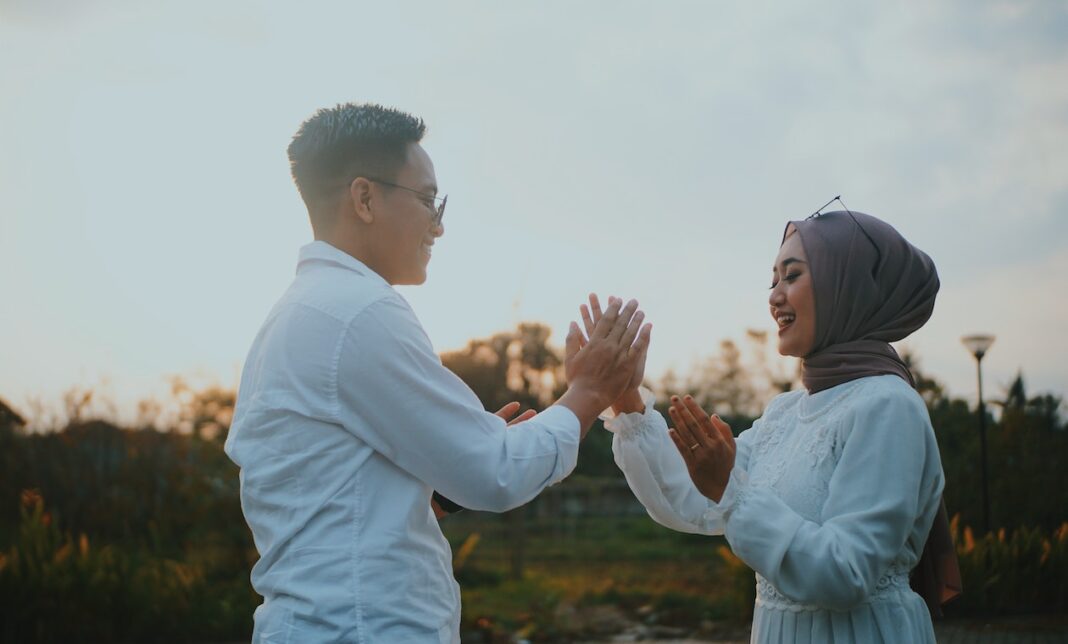The Secrets to Happy, Lasting Islamic Marriages
She knows by his face when he needs a word of encouragement. He knows that silence suits her best in the morning. They often finish sentences with a “you know what I mean” nod. Through the years they have rubbed off each other’s rough spots, grown together, and now, seeing them together, they look comfortable.
The Qur’an says: “And among His signs is this, that He created for you mates from among yourselves that you may dwell in tranquility with them, and He has put love and mercy between your (hearts); Verily in that are signs for those who reflect” (30:21).
When a woman and a man marry, this picture of companionship, love, and tranquility is their goal. Achieving it, though, is not simple or easy, and many of us do not. In the United States, 60% of marriages end in divorce. Even those that last beyond the honeymoon stages, before the challenges of everyday living set in, may become boring, unfulfilling, and driven by factors other than the true desire to remain in one another’s company. Muslim couples are not immune to the deadly influences that break up or stagnate marital relationships. Breakdowns in communication, difficulty discussing emotionally charged issues such as finances or child-rearing practices and the challenge of effectively resolving divisive issues are all factors that can sour a potentially gratifying marriage.
Some marital discord may occur simply because the couple came together for the wrong reasons or because they approached marriage with unrealistic expectations. Going into a marriage with eyes wide open is the first action toward the future success of the union.
Mahasin Salaam, happily married for 30 years, emphasizes the need to start out on the right foot. “If a marriage is started out by doing the proper things in the courtship, then that lays the foundation,” she says. Mahasin goes on to point out that having common interests and backgrounds is part of what makes a marriage work from the beginning, recalling that, “We had so much in common–the love for art, poetry, the importance of family life (we both come from close-knit families). The first night we met we talked for four to five hours. The communication is still good.”
Even though the particulars of a couple’s lives may differ, that sense of connection at the outset that Mahasin describes is important to the future of a marriage. Ann El-Moslimany, who has been married for 38 years, remembers that on first getting acquainted with her then-future husband, “I was definitely attracted by my husband’s piety, even though we were of different religions and at that time I never thought I would become Muslim. I was also strongly attracted to him physically, and I think that is important, too.”
Iman Sabir, who has been married for 30 years, agrees. She observes, too, that in most cases while the externals and details may change, the person’s basic nature remains constant, as her experience attests. “Before I married,” she says, “even before I became Muslim, I knew I wanted a man who was peaceful in nature and serious-minded. When I met my husband, it was these things in his character that attracted me to him. To this day he’s still the same.”
Even the most perfect marital matchups require effort to succeed, and the beginning stage of any long-term relationship involves a period of ironing out differences and learning to live together. Ibrahim Pasha, Imam at Atlanta Masjid of Al Islam, who counsels Muslim couples in need of marital advice, says, “Many couples enter into a marriage based upon the glamour of it, rather than the practicalities of it. Problems arise after marriage when more attention is given to the emotional and sentimental aspects rather than the fundamentals of marriage.”
Looking back at her marriage, Ann has realized that the best way to get through the adjustment period is for the partners to remain true to themselves while learning to compromise. Trying to take on stereotypical roles of husband or wife, or trying to mold the marriage partner into such a role, only causes problems in the future as expectations are created and broken. “When we first married,” Ann laughs, “it didn’t occur to me to expect my husband to help around the house. After we married, I moved into his apartment. I remember saying, ‘It’s my kitchen now. You stay out!’ I have never forgiven myself!”
A strong woman who knows herself and understands the freedom Islam gives her to express her humanity is in a good position to know what she needs from her partner.
“A woman should try to communicate to her husband how she wants to be treated. If he doesn’t get it, she has to keep saying what she wants from the relationship.”


